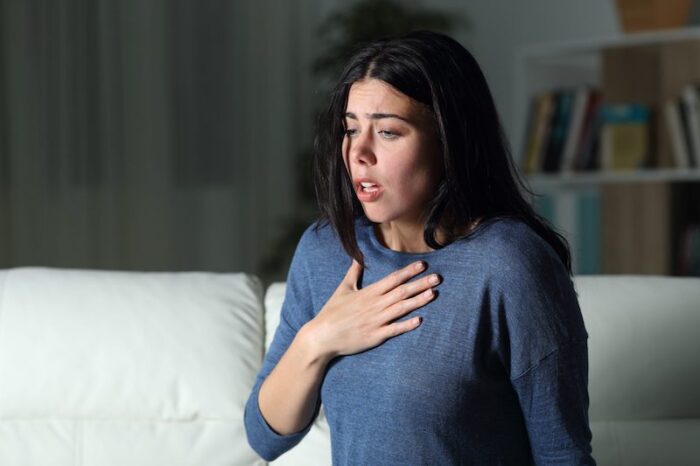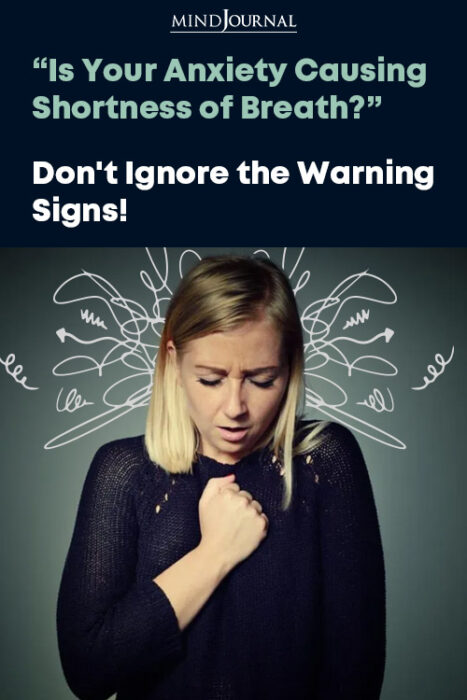The sensation of shortness of breath can be distressing, whether it’s a temporary loss of breath from a fall or a more severe asthma attack. But what’s even more unnerving is when you can’t pinpoint the cause behind your difficulty in breathing.
Surprisingly, for many individuals, anxiety may be lurking as the unexpected instigator.
As Juanita Guerra, Ph.D., a clinical psychologist said to USA Times, anxiety manifests uniquely in each person. While some may experience a knot in their stomach, others encounter a rapid heart rate or accelerated breathing.
Understanding when anxiety plays a role in shortness of breath and learning how to prevent it can be invaluable knowledge to tackle this unsettling experience.
What Causes Shortness Of Breath?
What causes shortness of breath is a very crucial question. Shortness of breath related to anxiety can stem from various reasons, but it is most often triggered when the body enters its flight-or-fight response mode following a distressing situation.
As explained by Amanda Darnley, PsyD, a practicing psychologist in Philadelphia, during this stress response, signals are sent from the brain to the rest of the body, preparing it to fight or flee.

Consequently, muscles, including those in the chest and abdomen, tighten or constrict, potentially making it more difficult to take deep breaths.
The combination of increased heart rate, tightened muscles, and heightened awareness can lead to a feeling of breathlessness or hyperventilation. People may also experience other physical symptoms, such as dizziness, lightheadedness, or a sense of suffocation.
These sensations can further amplify the feeling of anxiety attacks, creating a cycle of fear and physical discomfort.
How To Identify If Shortness Of Breath Is Due To Anxiety?
Determining whether shortness of breath is attributed to anxiety or another cause can be challenging, considering various potential culprits like heart issues, blood clots, lung conditions, and infections such as COVID-19.
Amidst this complexity, recognizing common triggers that previously led to distress or a similar response can be a helpful indicator.
Read more here: How To Help Someone With Anxiety Attacks: 6 Tips For Supporting A Loved One With Anxiety
Additionally, if the difficulty in breathing coincides closely with an emotionally stressful event, it strongly suggests an anxiety-related origin.
Moreover, a positive sign that it arises from anxiety is the ability to recover from the episode within 10-20 minutes, as many other respiratory conditions necessitate medical intervention.
According to Guerra, if the breathing troubles persist even after the anxiety attacks subside, it may indicate a more serious underlying medical condition that requires evaluation by healthcare professionals.
How To Stop Shortness Of Breath?
On being asked how to stop shortness of breath, Darnley advised that if you experience unknown difficulty in breathing, it’s better to seek urgent care to be safe.
However, if you recognize the cause as anxiety, there are ways to calm your body. Remind yourself that it’s not a medical emergency and will pass. Practice deep breathing, place your hands on your chest to feel the breath, or use a paper bag to balance oxygen and carbon dioxide levels.
Read more here: What A Panic Attack Feels Like: 3 Science-backed Ways To Cope
Nose breathing and focusing on mantras or counting with each breath can help too. Light exercise, warm water on hands, or stretching techniques can be beneficial for your well-being as well.
Most importantly, tackling the root cause of anxiety that led to the episode is essential to avoid frequent recurrences. Seeking professional assistance can provide personalized strategies to recover from such episodes more efficiently.
According to Darnley, psychologists and other specialists can guide you in learning relaxation techniques and coping skills to effectively face the triggers.









Leave a Reply
You must be logged in to post a comment.